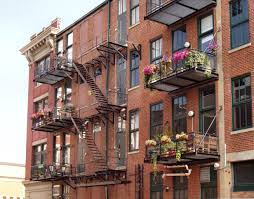 If you live in an apartment building, especially beyond the first floor, you should be prepared and have a plan in place in case of a fire.
If you live in an apartment building, especially beyond the first floor, you should be prepared and have a plan in place in case of a fire.
According to the NFPA, about 62 percent of fires responded to by firefighters between 2009-2013 were in apartment buildings, resulting in many fatalities, injuries and millions in property damage.
In a message from NFPA President James Pauley, many of the latest fire tragedies involving multiple loss of lives can be attributed to several factors:
- The use of outdated codes and standards
- Acceptance of reduced safety requirements to save money
- Ignoring referenced standards within a code
- Lack of education around the application of codes and standards
- Reduced enforcement
- A public unaware of the dangers of fire
As you can see, five out of six of these items are out of the control of the tenant in the apartment building. However, even though no two fires are alike, being aware of the dangers of fire, knowing basic fire safety and having a plan in case of an emergency is something that everyone can do to prepare for fire.
Here are some important things to know for fire safety in a high-rise residential apartment building:
- Be familiar with your floor’s evacuation plan. A diagram should be posted where you can see it.
- Be aware of the location so the fire exits in your hall, especially those near your unit.
- Always have a set of house keys and a flashlight in your nightstand.
- Always be sure your smoke alarms are working.
If the fire occurs in your unit…
- Leave immediately and close the door behind you to prevent the spread of heat and smoke.
- Don’t lock the door. It needs to be unlocked for the firefighters.
- Take your keys, flashlight and cell phone with you if it is safe to do so.
Then, be CALM:
C Call 911 and report the fire from a neighbor’s unit or outside the unit. Be specific. Give your floor and apartment number. Stay on the line to answer more questions and receive instructions.
- Alert building management and other tenants/security. Knock on doors and let them know there is a fire on the floor.
L– Listen for important information from fire officials. Your building may have a PA system that could be activated to give you instructions. If there is no PA system, the fire department will do a search of the building.
M– Move to safety as directed by the fire department.
If you smell smoke in your apartment building…
If you are in the apartment and smell smoke, call the fire department right away and let them know where you are. They may have information for you and be aware of the situation. Just because you smell smoke does not mean you are in immediate danger. The City of Chicago fire department recommends you stay in your unit unless told by the fire department to leave because in many cases, staying in place is the safer option.
In most cases, you will be asked to remain in place until the fire department gets there. If you smell smoke as you wait for the fire department, do the following:
- Keep your door closed
- Stuff wet towels around the door and vents to keep smoke out
- Open a window slightly, without breaking it, if heat and smoke are building up
- Stay low to the floor where air is cooler and cleaner. Smoke rises.
- If you are advised to leave the apartment, check the temperature of the door with the back of your hand. If it is warm to the touch in 5 seconds, do not open it. If cool, close the door and make your way to a safe stairway exit.
- NEVER use the elevator in fire emergencies since it may be in use by the firefighters. Never head to the roof since heat and smoke rise.
- Have your keys, flashlight and cell phone handy if you need to leave, but leave all other belongings behind.
You can find out more about high-rise fire safety in this video from the City of Chicago:
The best way to prepare for an emergency is to have an emergency plan. Always know where your fire exits are and know what to do in the event of a fire. At Total Fire & Safety, our job is to help residential buildings stay safe with up-to-date fire equipment. To find out more, visit totalfireandsafety.com
 Facebook
Facebook
 Instagram
Instagram
 LinkedIn
LinkedIn
